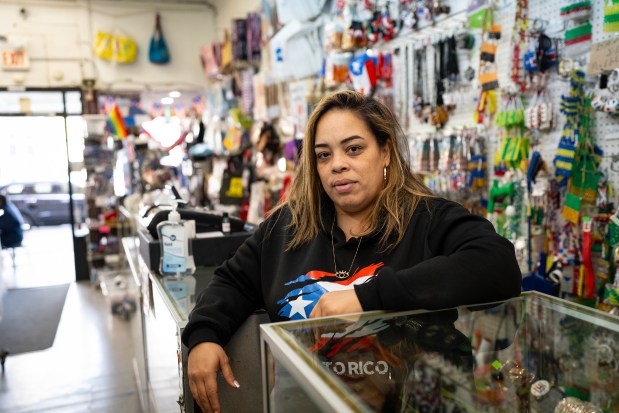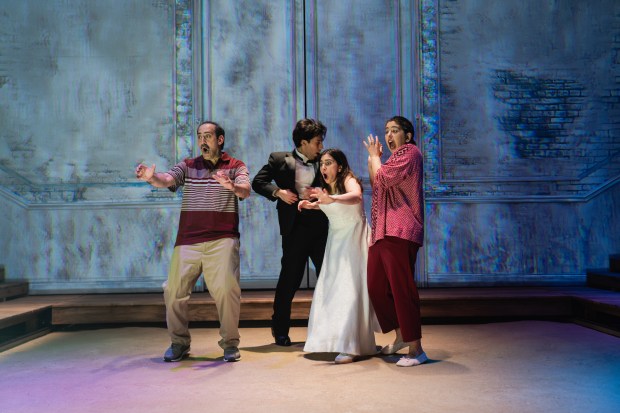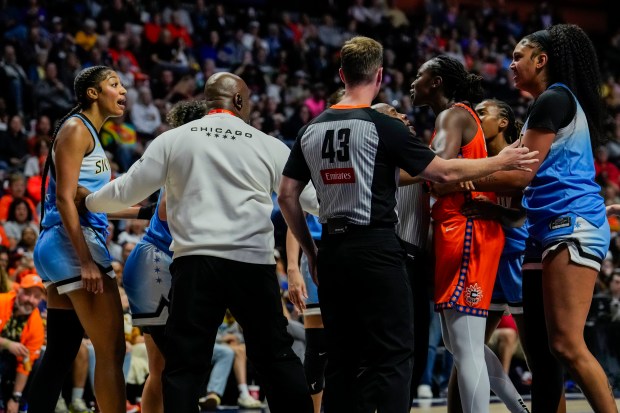For more than 40 years, Vanessa Massas’ grandparents have owned a record shop on Division Street in the heart of Humboldt Park, called Paseo Boricua by the Puerto Rican community.
As her grandfather, Angel Medina, opened Lily’s Record Shop on Monday morning, he walked between aisles of CDs and souvenirs featuring the Puerto Rican flag, speaking on the phone with other family members about the news.
We “couldn’t believe that those words came out of that guy’s mouth,” said Massas, the record shop manager.
After stand-up comic Tony Hinchcliffe referred to Puerto Rico as a “floating island of garbage in the middle of the ocean” at a Donald Trump rally Sunday at Madison Square Garden, Chicago Puerto Ricans said they felt the humiliation of a community that has long suffered from mistreatment and is often undermined. Hinchcliffe’s set also included lewd and racist comments about Latinos, Jews and Black people, all key constituencies in the presidential election.
Shortly after the comments were made, Grammy Award-winning superstar Bad Bunny, whose official name is Benito Antonio Martínez Ocasio, shared his support for Democratic candidate Vice President Kamala Harris, sharing her plan for the island in his social media. Other Latino politicians and artists, including Ricky Martin and Luis Fonsi, a Puerto Rican artist who sings the hit “Despacito,” as well as Puerto Rican leaders across Chicago, condemned the comments and pledged to rally voters to the polls.
Trump campaign spokeswoman Danielle Alvarez said in a statement, “this joke does not reflect the views of President Trump or the campaign.”
Chicago is home to one of the largest and most prominent diasporas of Puerto Ricans in the United States. The two Boricua flags in Humboldt Park solidify just how bold and strong the community is, said Jose Lopez, executive director of the Puerto Rican Cultural Center Juan Antonio Corretjer in Chicago, which he co-founded in 1973.
Lopez said that Puerto Rican leaders in Chicago and across the nation met Monday to find ways to inform the community and encourage them to vote.
Democratic U.S. Rep. Delia Ramirez, who represents Humboldt Park, told Tribune the comments “were despicable and disgusting.”
“If he (Donald Trump) has not come out to distance himself from the comments, that tells us what he means,” Ramirez said, urging those in swing states with large numbers of Puerto Ricans, such as Florida and Pennsylvania, to vote.
According to Lopez, the Puerto Rican community tends to vote. He said he is sure that the most recent comments will change some people’s minds, particularly in the island, where they’re urging “our relatives there to remember which politicians stood with the MAGA autocratic racists that constantly attack Puerto Ricans and vote with us in mind as we will vote with you in our hearts this November.”
Puerto Ricans cannot vote in general elections despite being U.S. citizens, but they can exert a powerful influence with relatives on the mainland. Phones across the island of 3.2 million people were ringing minutes after Hinchcliffe derided the U.S. territory Sunday night, and they still buzzed Monday.
Melvin Mathews, a doctor in Puerto Rico who is married to Medina’s niece, said that the story was “all over the news” in Puerto Rico Monday and that “everybody is offended by this comment.”
“Obviously whoever says this about Puerto Rico, first of all, they don’t know anything about Puerto Rico or they haven’t been here or seen the island,” Mathews said, adding that the island was the most stable in all of the Caribbean.
Massas said that these comments may influence the election given the many Puerto Ricans living in the mainland United States, including in Chicago.
“They forgot who are the people that vote,” Massas said. “There’s a lot of Puerto Ricans that vote, a lot.”
Puerto Rico became a U.S. territory in 1917, and the first large wave of migration occurred after World War II to ease labor shortages. There are now more Puerto Ricans in the U.S. than on the island.
Those who stayed behind say they often feel like second-class citizens because they can’t vote in presidential elections and receive limited federal funding compared with U.S. states.
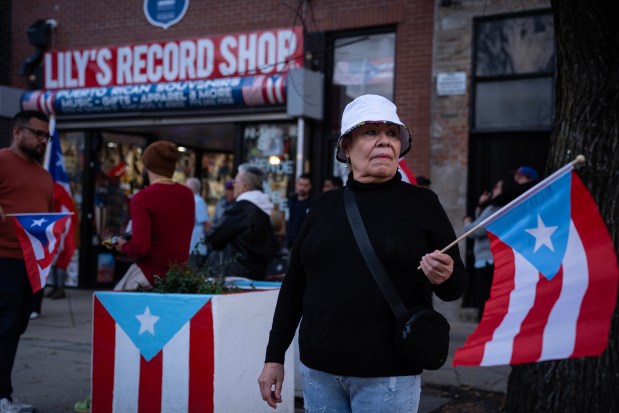
That festering resentment erupted when Trump visited Puerto Rico after Hurricane Maria slammed into the island as a powerful Category 4 storm in 2017. He tossed paper towels into a crowd and denied the storm’s official death toll, with experts estimating that nearly 3,000 people died in the sweltering aftermath.
In a tweet late Sunday, Mayor Brandon Johnson mentioned Trump’s paper towel controversy while criticizing Hinchcliffe’s comments saying they were “vile but completely unsurprising.”
“We haven’t forgotten about Trump throwing paper towels at island residents and blocking life-saving aid after Hurricane Maria in 2017. When people tell you who they are, believe them,” Johnson wrote.
Meanwhile, Massas said that her family’s business “speaks for itself” of the beauty and resilience of Puerto Rican culture in the city, surviving over the years despite gentrification in Humboldt Park.
On Monday evening, Massas planned to ride down Division Street flying the Puerto Rican flag with her motorcycle group to protest Hinchcliffe’s comments and show “how strong we are as a Puerto Rican community.”
“It’s horrible, it’s a disrespect to the people,” Massas said of the comments. “The people in Puerto Rico, no matter what happens, they stay strong and help each other. They treat you like family no matter where you’re from.”
The group has held rides in Chicago for other causes including aid to the homeless community, and sometimes attracts as many as 150 people from across Chicago and neighboring states, said Marilyn Nieves, another member of the Puerto Rican motorcycle group.
Nieves said she was “in total shock” when she heard Hinchcliffe’s comments, noting that many mainland Americans are currently making major financial investments in Puerto Rico.
“What is behind a comment like this?” Nieves said. “What is he trying to say, what is he trying to get at?”
Mabel Sanchez, a manager at the Paseo Boricua coffee shop La Sandwichera, said that her customers had been talking about the comments all morning Monday. Sanchez, who the customers refer to as “Titi,” meaning aunt, moved to the mainland U.S. from Puerto Rico when she was 5 years old.
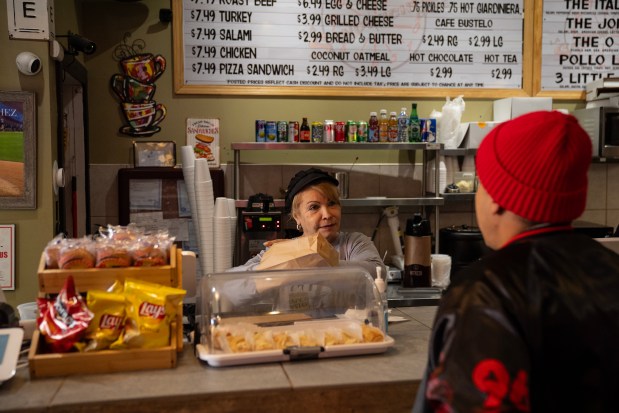
“He doesn’t have the right to do that,” Sanchez said of Hinchcliffe. “Everyone here, it hurts their feelings. … There’s a lot of people out there that make it a joke, the thing he said. That’s not no joke.”
Local Puerto Rican radio host Ray Rubio, who has a show on WSBC, said that “Puerto Ricans in the U.S. are up in arms today.”
“As a full-blooded Puerto Rican, that’s a big insult for me, to my heritage,” Rubio said. “They’re going to lose a lot of votes because of that, but because of that I’m glad. It’s very upsetting, because it does extend the ignorance and prejudice and racism.”
Medina’s daughter Belinda Medina, who was born and raised in Chicago, added that for her family, “our heart is there” in Puerto Rico, which made Hinchcliffe’s comments so hurtful.
“That sounded terrible, that hurts, after everything that the island’s been through. There’s so much devastation still there since (Hurricane) Maria,” Belinda Medina said. “We don’t see it as trash in the middle of the ocean, that’s not what we see. It’s the most beautiful place on the planet.”
The Associated Press contributed.


